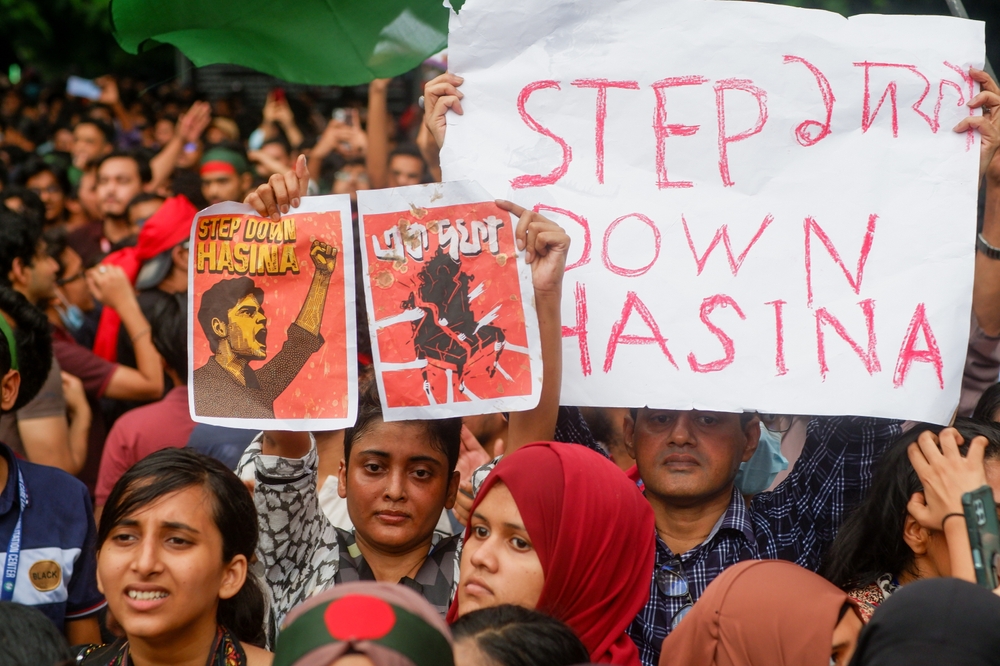

Hasina’s Last Stand: The Quota Movement, Student Uprising, and the Future of Bangladeshi Democracy
Billal Hossain
(Doctoral Student, Graduate School of Law, Hitotsubashi University)
August 30, 2024
Introduction
Bangladesh gained independence in 1971 after a tiresome nine-month war with Pakistan. The Bangladesh Awami League (BAL), led by Sheikh Hasina, has dominated Bangladesh’s political landscape since its return to power in 2008. Following two years of military-backed caretaker ruling, the Awami League scored a landslide victory in the 2008 general election. Hasina became Prime Minister. During that period, her government not only focused on economic growth, infrastructural development, and social changes, but she also started targeting the opposing party. Meanwhile, Digital Bangladesh, a vision for using technology to drive development, became a cornerstone of her administration.
Hasina’s Oppression
However, the 2014 general election was marked by controversy because the main opposition, the Bangladesh Nationalist Party (BNP), boycotted the vote, resulting in an uncontested victory for the Awami League in more than half of the seats. This election is known as the “night vote,” because most of the voting centers were captured on the night before the election, and BAL’s political workers voted that night. Both BAL party workers and police were in attack mode: according to CNN, at least 18 people were killed, more than 200s were injured, and 150 voting centers were burned.[1]
The Awami League won again in the 2018 general election. However, the election was heavily criticized both domestically and abroad for charges of vote rigging, voter intimidation, and suppression of the opposition.[2] Under Hasina’s leadership, the government tightened its grip on dissent, implementing media censorship and using the Digital Security Act to suppress opponents. After that, in early 2024, she won the general election again using all kinds of force, and no citizen was able to vote. For the purposes of international media coverage, some dummy election centers and candidates were assembled, and these events were broadcast in the media. This election is widely referred to by citizens as a “dummy election.”
Throughout her 16-year term, Hasina’s government was chastised for undermining democratic institutions, diminishing judicial independence, and violating human rights. The most hazardous aspect of her rule was that Bangladeshi citizens lost their ability to vote, as well as their freedom of expression. Furthermore, the BAL’s leader and workers, ministers, and government officials benefit from corruption by earning millions of dollars. Even Hasina accepted a $5 billion bribe from a Russian business to develop the Rooppur Atomic Electricity Project in Bangladesh.[3]
The Turning Tide
Meanwhile, the general student quota reform movement reached its peak. However, Hasina attempted to ignore it, as she did with other matters, in accordance with her authoritarian stance. But this time, she made a mistake. In the tumultuous days preceding Hasina’s departure, a sequence of escalating events exposed the widening gap between the government and Bangladeshis. On July 14, 2024, shortly after returning from China, Hasina dismissed the student-led quota campaign, even calling the demonstrators “children of Rajakar,” a profoundly derogatory word in Bangladesh that refers to collaborators during the 1971 Liberation War. This sparked fury among students, who replied with chants comparing her to an authoritarian leader. Rather than quell the protests, the government’s violent responses and subsequent curfew orders only fueled further unrest. On August 1, Hasina’s refusal to heed the students’ demands and her insistence on using force marked a critical miscalculation.
Despite appeals from her supporters to save her and increased efforts by party loyalists to quash the movement, the tide changed irreversibly. On August 5, amid escalating protests and rising public outrage, Hasina was forced to resign and leave the country, signaling the end of her dictatorial government. Before fleeing to India, she tried everything she could to keep her job. Despite her orders to the police and other forces to halt the bloody exchange, by August 16 the dispute had escalated to a tragic level, with police authorized to open fire on demonstrators, killing over 650 students and generals, injuring over 10,000, and arresting nearly 15,000 people.[4]
Following this, an interim government was formed, supported by the Bangladesh military. Dr. Muhammad Yunus serves as the chief adviser, among a group of 17 advisers in total. Two of these are students from the movement’s team. After Hasina’s departure, civil society constantly stated that “the military will take power,” but the military eventually rejected this path and discussed the situation with the students, who then chose Dr. Yunus as the provisional administration’s chief adviser. Now, the future of Bangladesh is dependent on this interim government. Almost all democratic and constitutional institutions in the country require renovation.
A Way Forward and the Remaining Problems
For the past 16 years, these institutions have been run by Hasina’s supporters, who benefit from the institutions and their positions. Following the reformation, a fair and neutral general election is needed to ensure democracy in government. However, there are several hurdles. Correct voter lists, a fair election commission, and the reformation of various political parties are among the requirements. Another concerning problem is the domestic situation in Bangladesh. Though Hasina resigned and fled to India, there are still many supporters of her party, and India’s intervention for the Hindu minority in Bangladesh exacerbates the current scenario. It is critical for this interim government to calm the situation and prevent the country from devolving into a civil war. In recent days, there have been some signs of civil unrest among BAL party workers, Hindu minorities, and BNP workers.[5] So in this situation, Dr. Yunus is first attempting to calm the volatile political environment, and then the government will endeavor to restore law and order.
Bangladesh may witness a renewed commitment to democracy if institutions like the Anti-Corruption Commission and the Election Commission are reformed, free and fair elections are held, and the transition is peaceful and successful.[6] However, the military will need to play a supportive but non-interventionist role until civil society and political parties reestablish confidence and discourse. Intellectuals underline the importance of bridging societal gaps and resolving the problems that motivated the protests against Hasina.
However, the fact that the political situation of the entire nation will be unstable if the reformation fails should be a matter for international concern. Owing to Hasina’s protracted 16-year dominance, the opposing party has reached the brink of chaos. They are currently portraying a hostile tone. There have been harmful activities in the temples and homes of the Hindu territory after August 5, 2024. Terrorists set fire to homes and temples, and some Minorites are trying to enter India.[7] In consequence, the Indian prime minister is addressing the problem and Hindus more broadly are joining the protest, which is further exacerbating the instability in Bangladesh. What is more, news reports have been released on the class dispute between BNP and BAL employees. This will exacerbate the minority issue, which is supported by religious groups from India. To tackle all these issues, the interim government must reshuffle the foreign policy with India.[8]
Conclusion
A military takeover is a likely outcome if the democratic process is not addressed quickly enough to enable orderly elections to take place, and the political climate becomes unstable. Deep political disagreements, along with economic difficulties and social unrest, may result in widespread violence and a military takeover, even though this is not a democratic practice.[9] Such unrest may impede the advancement of democracy and ultimately bring about a more authoritarian government. To prevent scenarios like this, a general election should be held as soon as possible following a reformation of the current system. However, citizens should also keep in mind that the interim government may serve as their means of enacting reforms, and so should be allowed a little space to act.
[1] Farid Ahmed, “Bangladesh ruling party wins elections marred by boycott, violence”, CNN (January 6, 2014). (https://edition.cnn.com/2014/01/06/world/asia/bangladesh-elections/index.html, Accessed on 21st August 2024). [2] Michael Safi, Oliver Holmes and Redwan Ahmed, “Bangladesh PM Hasina wins thumping victory in elections opposition reject as ‘farcical’”, The Guardian (December 31, 2018). (https://www.theguardian.com/world/2018/dec/30/bangladesh-election-polls-open-after-campaign-marred-by-violence, Accessed on 21st August 2024). [3] TMA desk, “Hasina, Joy and Tulip embezzle $5 billion from Rooppur project”, The Mirror Asia (August 18, 2024). (https://www.themirrorasia.net/news/2024/08/18/1956, Accessed on 21st August 2024). [4] Desk report, “Nearly 650 people killed in recent spate of violence in Bangladesh: UN report”, The Hindu (August 17,2024). (https://www.thehindu.com/news/international/nearly-650-people-killed-in-recent-spate-of-violence-in-bangladesh-un-report/article68535793.ece, Accessed on 21st August 2024). [5] Desk report, “Minorities faced 205 attacks after fall of Sheikh Hasina government in Bangladesh: Hindu groups”, The Hindu (August 10,2024). (https://www.thehindu.com/news/international/minorities-faced-205-attacks-after-fall-of-sheikh-hasina-government-in-bangladesh-hindu-groups/article68508954.ece, Accessed on 21st August 2024). [6] ABM Uddin, “We must strengthen our institutions to preserve democracy”, The Daily Star (August 13,2024). (https://www.thedailystar.net/opinion/views/news/we-must-strengthen-our-institutions-preserve-democracy-3675476, Accessed on 21st August 2024). [7] Desk report, “Hundreds of Bangladeshi Hindus gather at Indo-Bangladesh Border to seek refuge in India”, The Economic Times (August 10, 2024). (https://economictimes.indiatimes.com/news/international/world-news/hundreds-of-bangladeshi-hindus-gather-at-indo-bangladesh-border-to-seek-refuge-in-india/videoshow/112429571.cms?from=mdr, Accessed on 21st August 2024). [8] Thomas Kean, “After Hasina, Bangladesh needs a foreign policy reset”, Nikkei Asia (August 12, 2024). (https://asia.nikkei.com/Opinion/After-Hasina-Bangladesh-needs-a-foreign-policy-reset, Accessed on 21st August 2024). [9] Shafi Md Mostofa, “Bangladesh faces a hard road to overcome Hasina’s legacies”, East Asia Forum (August 17, 2024). (https://eastasiaforum.org/2024/08/17/bangladesh-faces-a-hard-road-to-overcome-hasinas-legacies/, Accessed on 21st August 2024).
Billal Hossain is a Bangladeshi Ph.D. student at the Graduate School of Law, Hitotsubashi University in Tokyo, Japan, where he is researching green innovation and international relations. Before beginning his doctoral studies, Hossain earned a master’s degree from the School of International and Public Policy at Hitotsubashi University.
